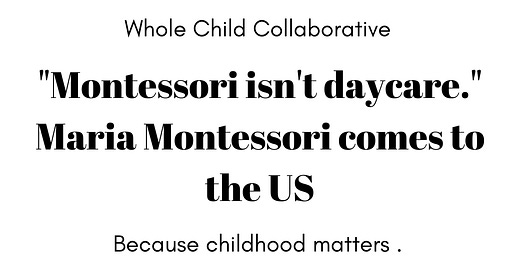On IG, I recently shared a new post about using the phrase "Montessori isn't daycare." For nearly my entire career, even in my assistant days, I have felt incredibly defensive when someone referred to my work in a Montessori school as working in a daycare. "Montessori is NOT daycare." I would then educate them about the differences in the Montessori school I worked at and how, unlike a daycare, it was a REAL school with REAL educators. I spent many years working in daycare settings as a high school senior into college. And again when my oldest was tiny, and my husband lost his job. I remember changing diapers and sweeping what felt like gallons of food off the floor after lunchtime. I occasionally sat down and played with the children, but that's not what I remember most clearly. I vividly remember the grunt work and interiors that felt like prisons but with Noah's Ark scenes painted on the walls.
This is NOT what I did. I was a teacher, not a daycare worker. I worked in a school, NOT a daycare center. It felt imperative for people to know the difference. I've often heard this phrase from colleagues and Montessori parents throughout my career. Now, many years into my career, I wonder why. Why did I care so much about whether folks thought I worked in a daycare? Was I somehow above that work? I viewed work in childcare centers as insignificant and wanted desperately to separate my work. I didn't think very much about the systems that caused work with young children to be so devalued. I needed to understand the fundamental importance of caring for young children. Because, as a society, our culture has conditioned us to find childcare grimy, low-wage work. Anyone can watch the kids as long as the adults can get to their more meaningful work that keeps the money flowing.
But not Montessori schools. Montessori schools are beautiful, and the teachers are educated. Those are just a few things you might hear on a Montessori school tour as someone shares that this is a Montessori school, not a run-of-the-mill daycare center. Montessori is more than childcare. But that's precisely how Dr. Montessori began her work in the earliest Montessori schools. Dr. Montessori's first school in Italy was not in a beautiful, historic mansion or top-notch school facility like many Montessori schools in the US today. It was on the first floor of low-income housing. And it was created because working parents desperately needed a place for their children while they worked in factories. In the US, Montessori education comes with a side of elitism. A healthy dose of "this is not a daycare. We are above that."
Do you know how Dr. Montessori's schools came to the US? It was through a famous women's magazine, McClure's. McClure's did a spread on Montessori education in Italy and the brilliant students it cranked out. This would be today's equivalent of Kim K. dropping her kids off at a Montessori school, then taking a behind-the-scenes peek at the classrooms on Keeping Up with the Kardashians. Wealthy white mothers suddenly took an interest in this educational method, with no accurate understanding of its roots in caring for and educating poor children. Sound familiar?
Montessori came to the US at the turn of the 20th century. The method was, at first, accepted with enthusiasm. Wealthy white Americans were thrilled to learn about young children reading and writing at such early ages (Whitescarver & Cossentino, 2012). But it wasn't long before the honeymoon was over. Montessori left the US after being criticized by American educators, who wrongfully accused Dr. Montessori of being behind the times of educational research of the day. One of these early criticisms of Montessori education was over the amount of freedom given to children. These early American critics viewed teachers as the center of the classroom and were uncomfortable de-centering the adult to educate the child (Thayer-Bacon, 2012). John Dewey was one of these early critics whose views on early reading sparked the "whole language" movement of reading instruction, which is now being repaired by the science of reading. Dr. Montessori, who believed that phonics instruction was best, continues to have her work validated by educational research. Despite the criticisms, Montessori spoke on the liberation of the child throughout her writings. In Spontaneous Activity in Education, she writes: "His social sentiments in the relations he forms with other free and active children, his collaborators in a kind of household designed to protect and aid their development; the sense of dignity acquired by the child who learns to satisfy himself in the surroundings he himself preserves and dominates—these are the co-efficients of humanity which accompany 'liberty of movement." (Montessori, 1917, p. 151-152).
As I grow in my understanding of what Montessori education is, I have to examine my own beliefs and practices. And the belief that “Montessori isn’t daycare” just isn’t holding up for me anymore. Are there differences between a Montessori school and a traditional childcare center? Of course there are. But is one inherently more valuable than the other? No. Dr. Montessori believed caring for young children is valuable and should be studied and supported to provide children and families with the highest quality experiences. She believed that the world could be changed through this work. And she held onto this belief during times of war and turmoil. Quality childcare has the potential to change the world, whether it’s Montessori or not.
Thanks for reading! If this resonated with you, I’d be so grateful if you shared it! And I’d love to hear your thoughts, so be sure to tag me!
References:
Whitescarver, K., & Cossentino, J. (2008). Montessori and the Mainstream: A Century of Reform on the Margins. Teachers College Record, 110(12), 2571–2600. https://doi.org/10.1177/016146810811001202
Thayer-Bacon, Barbara J. (2012) "Maria Montessori, John Dewey, and William H. Kilpatrick,"Education and Culture: Vol. 28 : Iss. 1, Article 3.
Available at: https://docs.lib.purdue.edu/eandc/vol28/iss1/art3


